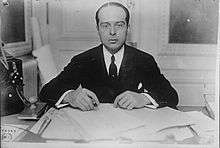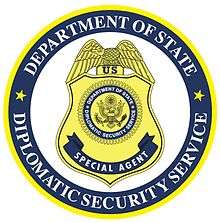Bureau of Secret Intelligence
The Bureau of Secret Intelligence (Office of the Chief Special Agent) was founded in 1916. The U.S. Department of State's Bureau of Secret Intelligence, later known as the Office of Security (SY) and now as the U.S. Diplomatic Security Service, was also known as U-1, an off-the-books adjunct to the Division of Information.[1]
.jpg)
The origins of the U.S. State Department's Diplomatic Security Service (DSS) goes back to 1916 with a handful of agents assigned special duties directly by the Secretary of State (SECSTATE), Robert Lansing.
Lansing, who used MID and Department of the Treasury Secret Service agents to obtain secret information, longed for direct control over his own agents; therefore, in 1916 he created a Bureau of Secret Intelligence.[2]
President Wilson allowed Lansing and Frank Polk quietly and informally to channel the flow of military and law enforcement material into the State Department's Bureau of Secret Intelligence (U-1). The two men picked a young clerk named Leland Harrison "to take charge of the collection and examination of all information of a secret nature coming into the Department from various sources and also to direct the work of the agents specially employed for that purpose."[1]

Lansing moved to create this inter-agency "secret service" for the Department of State. Many German and Austrian acts of fraud, propaganda, sabotage, and espionage cut across or fell between the jurisdictions of various U.S. law enforcement agencies. Secretary of the Treasury William McAdoo admitted that the Secret Service, the Federal Bureau of Investigation, and the Post Office Inspection Service were often "crossing wires with [one] another in running down crimes and conducting investigations" of espionage, fraud, and sabotage. To rectify this, Lansing proposed creating an office under the Department of State’s Office of the Counselor to review investigation reports from several law enforcement agencies.[3]
In proposing this to President Wilson, Lansing contended that given the serious diplomatic consequences involved with both the act and the investigation, the Department of State should oversee the response and actions of other agencies. Lansing envisioned the proposed office to be a clearinghouse of information, and he hoped that the Departments of Justice and Treasury, and the Postal Service would detail agents to this Bureau of Secret Intelligence to gather information on belligerent activity in the United States.[3]
As Robert Lansing recalled in his memoirs, "The 'Secret Service' of the Department of State was an organization of slow growth during the period when this country was neutral. Prior to that time the Department had no 'Secret Service'. It was found necessary for the Department to conduct some investigations of highly confidential character and for this purpose a few operatives of other departments were detailed to it. Agents were also employed in the other countries.[4]
Headed by a Chief Special Agent, who was also called Special Assistant to the Secretary, these agents worked in Washington, D.C., and New York City. This group of agents would sometimes be referred to as the office of the Chief Special Agent. They were operated with private funds from the Secretary's office. Conducting sensitive investigations, they focused mainly on foreign agents and their activities in the United States.
References
- Allen Dulles: Master of Spies by James Srodes 1999; Page 83
- The Armies of Ignorance: The Rise of the American Intelligence Empire by William R. Corson, 1977; Page 74
- History of the Bureau of Diplomatic Security of the United States Department of State, Page 6
- Srodes, page 45
- Lawrence in Arabia: War, Deceit, Imperial Folly and the Making of the Modern Middle East, by Scott Anderson (Doubleday, 2013), Kindle Loc. 7212–7257:
